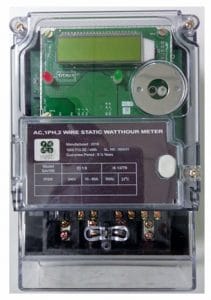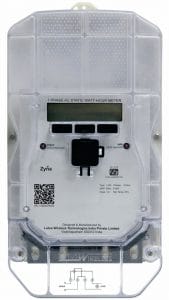 Smart meters represent the latest technological advances in the Indian power sector. The government is embarking on some aggressive smart meter roll-out plans, but there are a few roadblocks that are causing delays in achieving the targets.
Smart meters represent the latest technological advances in the Indian power sector. The government is embarking on some aggressive smart meter roll-out plans, but there are a few roadblocks that are causing delays in achieving the targets.
By Shruti Mishra
For a country like India where power thefts are like an epidemic, smart meters can help to prevent huge power losses. Unlike the traditional variants, smart meters not only provide a complete breakdown of the consumers’ energy consumption but also give a real-time analysis of the quality of power being supplied. Therefore, the use of smart meters has been identified by the government as a game changer for the ailing power distribution system of the country in two crucial ways. First, it will handle the issue of electricity losses, both technical and non-technical; and second, it will help the power companies to address their inefficiencies, which not only contribute to their losses and debt burden but also to customers being charged a higher power tariff. It is good to see that both the government and private utilities are coming together to deploy these meters. However, there are some hindrances related to internal regulations that are restricting the complete acceptance of smart meters in India.
Barriers to be overcome
An unfavourable policy framework: Many domestic manufacturers feel that despite having updated technology, certain government norms and bidding criteria are restricting them from becoming frontrunners in this space. Kalichamy K., CEO and MD, Inesh Energy, feels that the majority of the industrial players are still not ready with the technology to meet the latest specifications, and their development road map extends far beyond the slated deployment target dates of the government. “There is advanced technology available with MSMEs/startups like us, who have been struggling to fight for an entry into this sector, in terms of seeking certain commercial and financial waivers in the government tenders,” Kalichamy says. Regrettably, even after demonstrating the suitability of their technology at the highest levels of the government, these MSMEs and startups are not getting the recognition and business opportunities they deserve.
Underlining the woes of MSMEs and startups in the smart meter sector, Kalichamy says that the government’s tender norms and conditions are preventing MSMEs from entering this market in spite of them having superior technology and supply capabilities. “There are BQR (basic qualification reviews) which seek huge turnover limits, previous supply experience to the government, etc. An MSME can never enter this market with such conditions. Since all the tenders require previous experience of supplying to the government, new MSMEs get disqualified in all of them.” He strongly believes that to spur domestic manufacturing of smart meters, the government should improve the support system for MSMEs.
Raw material woes: Smart meters are electronic devices, for which components like capacitors, latching relays and coil wound compounds are required. Since the Indian semiconductor market is still not mature enough to fulfil the needs of manufacturers, the latter have to depend entirely on imports for crucial components like MCUs, LCDs, capacitors and resistors.
Binu S. Pillai, business head, Lotus Wireless Technologies India Pvt Ltd, says, “Factors like the variation in the component prices and the erratic availability of certain special RF components have been minor concerns for manufacturers.”
Rapid technology transformation
The fast-paced tech advances, from electro-mechanical to digital meters and then to smart meters, led to many legacy energy meter players exiting the market. These players could not cope with the smart revolution because of the high costs of upgrading their technology. In addition, the traditional tendering processes, which require a minimum turnover and previous government-supply experience, are also big barriers that are preventing the widespread adoption of smart meters in the country. “These conditions favour the big players in such a way that until they are ready with the technology, the projects will never take off,” adds Kalichamy.
Domestic vs foreign metering solutions
A leading manufacturer points out that the domestic market for smart meters is currently close to 200 million units in size. And according to Navigant Research, India represents the largest untapped smart meter market in the world because over 290 million users are still sticking to the traditional electric meters. To tap this large market, the government has issued high-volume purchase orders to both domestic and foreign smart meter companies. This scenario has raised concerns from some local manufacturers who feel that foreign entrants might cripple their business.
With regard to this, Pillai shares, “Indian smart meter manufacturers are facing a tough challenge due to the variations in specifications from the different utilities, which then requires going through multiple design cycles and certifications. The various tamper-proof conditions being mandated by the government are driving up the cost of manufacturing, while the fierce competition from imported products is driving prices down. In this scenario, several manufacturers have been forced to cut corners to survive in the market.”
On the flip side, certain other local manufacturers think that the varying tamper-proof conditions give an edge to the domestic players. Jitendra Agarwal, joint MD, Genus Power Infrastructure Ltd, points out that indigenous smart meter firms can easily upgrade their products to comply with these tamper-proof norms and deliver cost-effective and efficient energy metering solutions that are globally in demand too.
Agarwal adds that foreign companies, with their limited knowledge of India-specific requirements and certifications, may not give tough competition but definitely pose a threat in the short term. “We firmly believe that India is a complex market with complex metering requirements and, ultimately, only indigenous companies will prevail. But in the mean time, some of these foreign entrants have the potential to disrupt the market by introducing cheap and unreliable products that do not match with the ever changing India-specific requirements,” he says.
Kalichamy also explains why foreign players will not pose any threat to local smart meter manufacturing. “One reason is the price requirement, which none of the European makers can match. The Chinese may compete on price but not on quality. The second reason is the local specifications, which foreign players still fail to match up to,” he says.
New products available in the market
Model: Saksham-345, Manufacturer: Genus Power Infrastructures Ltd
 Key features
Key features
-
Rated voltage: 240V
-
Frequency: 50 Hz ±5 per cent
-
Operating temperature range: -10° to +55°C
-
Storage temperature range: -25°C to +70°C
-
Operating humidity: Up to 95 per cent
-
Degree of protection: IP51
Contact: www.genus.in
Model: SPSMART-100, Manufacturer: Inesh Smart Energy Pvt Ltd
 Key features
Key features
-
Nominal voltage: 220V–240V
-
Modes of display: Auto, push, info and battery mode
-
Compliance: IS16444
-
Onsite programmable prepaid, postpaid, dual source meter and net meter
-
Real-time pluggable communication (RF/PLC/GPRS)
-
End-to-end DLMS
-
Remote load control – Integrated remote connect/disconnect
-
Degree of protection: IP51
-
Dimensions (LxWxH): 105mm x 155mm x 70mm
Contact: www.ineshenergy.com
Model: Zyana, Manufacturer: Lotus Wireless Technologies India Private Limited
 Key features
Key features
-
Compliance: IS13779
-
Detects and records tamper attempts even when powered off
-
865MHz – 867MHz connectivity for AMR, GPRS connectivity for WAN
-
Infra-red interface for meter data reading on DLMS
-
Optical port interface
Contact: www.lotuswireless.com



























